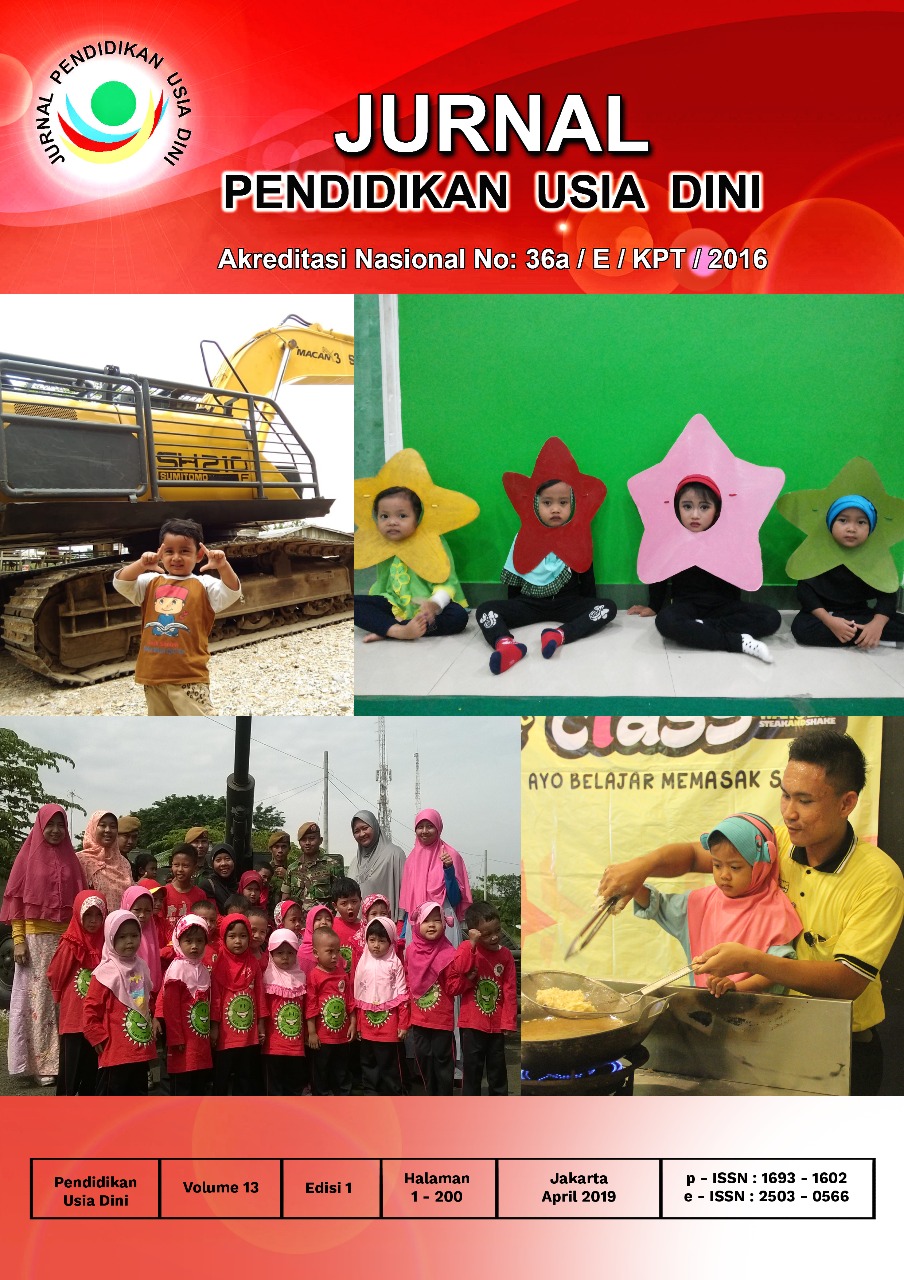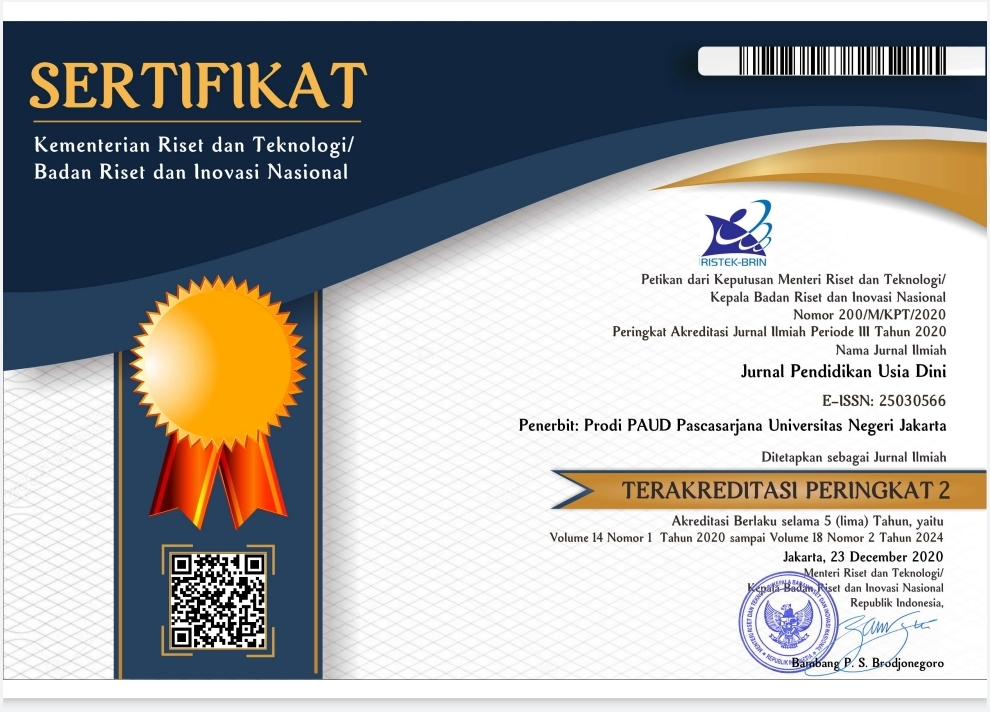Evaluation of Content Curriculum in Kindergarten
DOI:
https://doi.org/10.21009/10.21009/JPUD.131.06Abstract
This study aims to map the quality of the curriculum used by kindergartens in Jakarta. The mapping curriculum was done by looking at the suitability curriculum with stages of child development, accommodating children's needs, using child-centered learning processes, and utilizing technological developments. Subjects were 32 kindergarten institutions in Jakarta (North Jakarta and Jakarta Central), from 14 districts. Kindergarten institutions studied were chosen to represent each district. In collecting data, the researchers conducted an analysis content of curriculum and interview with respondents and informants in kindergarten institu-tions either principals or teachers in schools who selected as samples. The research team col-lected information as a result of observation and described in-depth interviews in the diary of researchers — the data collected from 16 kindergartens that are willing to research subject. The data consisted of curriculum documents, curriculum evaluation instruments and inter-views’ the results analyzed qualitatively from the beginning of the data collection process in-clude data reduction, data presentation, and conclusion.
Keyword: Content, Curriculum, Evaluation, Kindergarten
References
Burchinal, M. (2018). Measuring Early Care and Education Quality. Child Development Perspectives, 12(1), 3–9. https://doi.org/10.1111/cdep.12260
Dhieni, N., & Utami, A. D. (2013). Evaluasi Konten Kurikulum Taman Kanak-Kanak di DKI Jakarta Tahun ke 1 dari rencana 3 tahun. Jakarta: FIP press.
Dodge, D. T. (2004). Early Childhood Curriculum Models Why What and How Programs Use them. Exchange Organizational Behavior Teaching Journal, (February), 71–75.
Eliason, C., & Jenkins, L. (2008). A Practical Guide to Early Childhood Curriculum 8th. New Jersey: Pearson Prentice Hall.
Fox-turnbull, W. (2007). Implementing Digital Technology in The New Zealand Curriculum.
Gestwicki, C. (2007). Developmentally Appropriate Practice Curriculum, and Development in Early Education 3rd Ed. New York: Thomson Delmar.
Hainstock, E. G. (2002). Montessori untuk Prasekolah. Jakarta: Pustaka Delapratasa.
Hasan, S. H. (2008). Evaluasi Kurikulum. (U. & R. Rosdakarya, Ed.). Bandung.
Haslip, M. J., & Gullo, D. F. (2018). The Changing Landscape of Early Childhood Education: Implications for Policy and Practice. Early Childhood Education Journal, 46(3), 249–264. https://doi.org/10.1007/s10643-017-0865-7
Jackman, H. L. (2012). Early Education Curriculum: A Child’s Connection to the World Fifth Edition. Belmont: Wadsworth: Cengage Learning.
Jacman, H. (2012). Early Education Curriculum. Pedagogical Development Unit, (FEBRUARY 2011), 163. Retrieved from https://www.eursc.eu/Syllabuses/2011-01-D-15-en-4.pdf
Kostelnik, M. J., Soderman, A. K., & P, A. (2007). Whiren, Developmentally Appro-priate Curriculum: Best Practices in Early Childhood Education 4th. New Jersey: Pearson Prentice Hall.
Mak, B., Keung, C., & Cheung, A. (2018). Analyzing Curriculum Orientations of Kindergarten Curriculum. In Teacher Education, Learning Innovation and Accountability, (pp. 135–153). Singapore: Springer Singapore. https://doi.org/10.1007/978-981-13-2026-2
Odom, S. L., Butera, G., Diamond, K. E., Hanson, M. J., Horn, E., Lieber, J., … Marquis, J. (2019). Efficacy of a Comprehensive Early Childhood Curriculum to Enhance Children’s Success. Topics in Early Childhood Special Education. https://doi.org/10.1177/0271121419827654
Plowman, L., Stephen, C., & Mcpake, J. (2010). Growing Up with Technology (pp. 1–169). London and New York: Routledge.
Roopnarine, J. L., & Johnson, J. E. (2005). Approaches to Early Childhood Education 4th Ed,. New Jersey: Pearson Prentice Hall.
Sarama, J., & Clements, D. H. (2019). From Cognition to Curriculum to Scale. Cognitive Foundations for Improving Mathematical Learning. https://doi.org/10.1016/b978-0-12-815952-1.00006-2
Wood, E., & Hedges, H. (2016). Curriculum in early childhood education: critical questions about content, coherence, and control. Curriculum Journal, 27(3), 387–405. https://doi.org/10.1080/09585176.2015.1129981
Yang, W., & Li, H. (2019). Changing culture, changing curriculum: a case study of early childhood curriculum innovations in two Chinese kindergartens. Curriculum Journal, 0(0), 1–19. https://doi.org/10.1080/09585176.2019.1568269
Downloads
Published
How to Cite
Issue
Section
License
JURNAL PENDIDIKAN USIA DINI work is licensed under a Creative Commons Attribution 4.0 International License. (http://creativecommons.org/licenses/by/4.0/)





